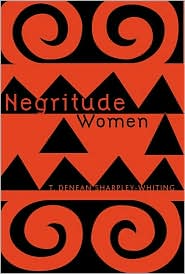Negritude Women
The Negritude movement, which signaled the awakening of a pan-African consciousness among black French intellectuals, has been understood almost exclusively in terms of the contributions of its male founders: Aimé Césaire, Léopold Sédar Senghor, and Léon G. Damas. This masculine genealogy has completely overshadowed the central role played by French-speaking black women in its creation and evolution. In Negritude Women, T. Denean Sharpley-Whiting offers a long-overdue corrective, revealing...
Search in google:
The Negritude movement, which signaled the awakening of a pan-African consciousness among black French intellectuals, has been understood almost exclusively in terms of the contributions of its male founders: Aimé Césaire, Léopold Sédar Senghor, and Léon G. Damas. This masculine genealogy has completely overshadowed the central role played by French-speaking black women in its creation and evolution. In Negritude Women, T. Denean Sharpley-Whiting offers a long-overdue corrective, revealing the contributions made by four women-Suzanne Lacascade, Jane and Paulette Nardal, and Suzanne Roussy-Césaire-who were not merely integral to the success of the movement, but often in its vanguard.Through such disparate tactics as Lacascade's use of Creole expressions in her French prose writings, the literary salon and journal founded by the Martinique-born Nardal sisters, and Roussy-Césaire's revolutionary blend of surrealism and Negritude in the pages of Tropiques, the journal she founded with her husband, these four remarkable women made vital contributions. In exploring their influence on the development of themes central to Negritude-black humanism, the affirmation of black peoples and their cultures, and the rehabilitation of Africa-Sharpley-Whiting provides the movement's first genuinely inclusive history. T. Denean Sharpley-Whiting is professor of Africana studies and Romance languages and chair of Africana studies at Hamilton College.
AcknowledgmentsIntroduction: Caliban's Women11Race Signs of the Interwar Times: Pan-Noirisme and La Depeche Africaine252Jane Nardal: A New Race Spirit and the Francophone New Negro383Les Soeurs Nardal and the Clamart Salon: Content and Context of La Revue du monde noir, 1931-1932524Paulette Nardal: Antillean Literature and Race Consciousness685Suzanne Cesaire: Tropiques, Negritude, Surrealism, 1941-194580AppBlack Internationalism (1928)105AppExotic Puppets (1928)108AppActs of Grace (1929)114AppIn Exile (1929)116AppThe Awakening of Race Consciousness among Black Students (1932)119AppLetter from Lieutenant de Vaisseau Bayle, Chief of Information Services, to the Editor of the Review Tropiques (May 10, 1943)125AppResponse from Tropiques (May 12, 1943)128AppThe Malaise of a Civilization (1942)130AppThe Great Camouflage (1945)135Notes141Selected Bibliography157Index159








